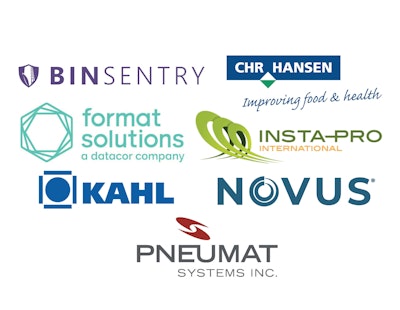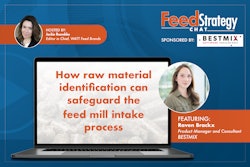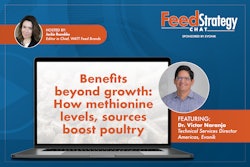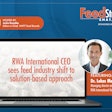BinSentry's CEO Ben Allen explores artificial intelligence's (AI) imminent impact on agriculture, revealing its potential to revolutionize operations, cut costs and boost efficiency in the feed industry. Forget job displacement fears — AI emerges as a crucial tool for addressing rural labor challenges. Join the conversation on January 30, 2024, at the Feed Mill of the Future Conference.
Transcription of Feed Strategy Chat with Ben Allen, CEO, BinSentry
Jackie Roembke, editor in chief, WATT Feed Brands and Feed Strategy: Hi, everyone. Welcome to Feed Strategy Chat. I’m your host, Jackie Roembke, editor in chief of WATT Feed Brands and Feed Strategy magazine.
This edition of Feed Strategy Chat is brought to you by the Feed Mill of the Future Conference. This half-day event will bring together leading feed industry experts to examine emerging feed mill technologies. The conference will be held on January 30 at IPPE 2024. It is produced by Feed Strategy and Feed & Grain, and is organized in partnership with the American Feed Industry Association (AFIA). To learn more about the 2024 edition of the Feed Mill of the Future Conference, visit www.feedmillofthefuture.com.
Today we're joined by Ben Allen, CEO of BinSentry. He's here to delve deeper into artificial intelligence’s potential impact on agriculture.
Hi, Ben, how are you today?
Ben Allen, CEO, BinSentry: I'm doing well. Jackie, how are you doing?
Roembke: I'm doing great, thank you. Thank you so much for taking the time to speak with us. Let's get right into it. Obviously, there's been a lot of buzz about artificial intelligence, or AI as we will call it in this interview. Please describe how you think AI may impact the ag sector over the next five years and any likely applications you think might be on deck.
Allen: Sure. It's a super interesting time and technology. Now, in the early and mid-90s, we kind of converted over to the internet — and that was a new thing for us. The wave of technology that is crashing over us now is artificial intelligence. You know, AI, we mean artificial intelligence, not artificial insemination in this talk, but artificial intelligence is coming on quickly. It's moving significantly faster than any of the internet tech did — and that's what's hard for people to grasp. But as they wake up to it, they're starting to see it in the headlines in every major industry. It's starting to have real impact. It's in defense, we're flying fighter planes with AI. It's in logistics, we're driving trucks and doing dispatching. And it's coming from agriculture because (agriculture) is very complex. There are many opportunities to increase efficiency using artificial intelligence.
Roembke: As advancements in AI rapidly unfold, how do you suggest ag companies and other relevant stakeholders stay on top of these advancements and their potential to impact their businesses?
Allen: Great question. Most execs or business owners in agriculture that I have talked to are staying away from this issue just because they don't know what to do with it. I generally help them understand how to frame this issue. How do we think about it? And to frame it up, what you want to think about is the operating advantage. You want to use technology in areas where you cut costs, increase efficiencies, increase safety, whatever that metric may be. That's when technology can be applied.
If you think about artificial intelligence, there are still some feed operations using rubber mallets to check inventory and then calling it in and putting in Excel. That works. It's not highly efficient, but it does work. We operate that way. Others are using sensors and software and artificial intelligence algorithms to manage that inventory. And those logistics, the operating advantage of using artificial intelligence in that setting versus Excel and a rubber mallet is significant. It is hundreds of basis points of operating costs. And in some cases, it is the difference between profitability and losses.
If you want to think about ‘what can AI do for me?’ It's really ‘what can technology do for me?’ It's where can I home in to bring a lot of advantage in my business, and pull costs out about being more efficient, more accurate and more timely with the data.
Don't miss Allen's discussion, "The power of AI: Using hidden data to increase feed mill margins, animal health," at the 2024 Feed Mill of the Future Conference.
Roembke: Shifting from agriculture as a whole to look more specifically at the feed industry, can you provide some potential applications that the producers can use or how that technology may evolve to serve their needs?
Allen: Happy to. So artificial intelligence in the feed industry, specifically today, BinSentry has recently received patents in this space to be more accurate in highly accurate inventory readings. We can use artificial intelligence in dispatch, in scheduling, in timing of the logistics. Feed moves 24/7.
Are you shipping truckloads of feed to make sure the animals are taken care of? We're putting weight on the animals in the appropriate time, right feed, right place, right time. But we also want to make sure that we're being as ruthlessly efficient as possible. Manual processes, Excel and phone calls just aren't that efficient in comparison to what artificial intelligence can do.
Artificial Intelligence effectively takes the mundane tasks of the scheduling, and matching loads with timing and deliveries, and it can make that significantly faster and more efficient than humans can.
We want to offload that admin work, that data crunching, into artificial intelligence that can do it very quickly and cheaply so that the humans can work on the hard parts. That the humans can worry about the breakdowns of equipment and the weather and the relationships in the business. That's where they're going to be best. There's a real need for focus in those areas as well.
Roembke: Excellent. Thank you very much for those insights. Now, one of the main talking points as it relates to AI is the potential to impact the job market. How do you think that the adoption of AI could affect the feed sectors workforce? And let's look at it both in terms of job creation and maybe possibly displacement.
Allen: Yeah, I think there's two areas for that, but most of the world is worried about AI taking jobs. But most of the world doesn't have the labor challenge that agriculture has. Ag has this rural labor challenge of can we get great people that are happy to live out in the country and do this work? This is hard work. We all know it. And most of our customers that we work with in agriculture are straining to find great people. So they're not worried about cutting jobs, they don't have excess labor, they need more quality labor.
I really think for agriculture, artificial intelligence is going to relieve job stress. It's going to relieve some of that labor challenge for companies. In terms of agriculture, I don't have the same stress that I would if I were in a media business or, you know, the entertainment business where AI is generating things that humans do. We need help. In agriculture, we need technology to make labor go further. We need to be able to free up our hours and our people so that they're not doing the mundane data crunching, they're doing the hard work. I think it's going to be a net benefit for us.
Roembke: Very good. If you'd like to learn more about AI and potential applications in agriculture, please attend the Feed Mill of the Future Conference. Here, Ben will be presenting about this topic. To learn more about artificial intelligence in agriculture, attend the Feed Mill the Future Conference to hear Ben's presentation on the topic. The event will be held on January 30 at IPPE 2024.
For more information and to view the agenda, please visit www.feedmillofthefuture.com. Thank you so much, Ben, and thanks to you for tuning in.
THE 2024 FEED MILL OF THE FUTURE CONFERENCE IS SPONSORED BY



















